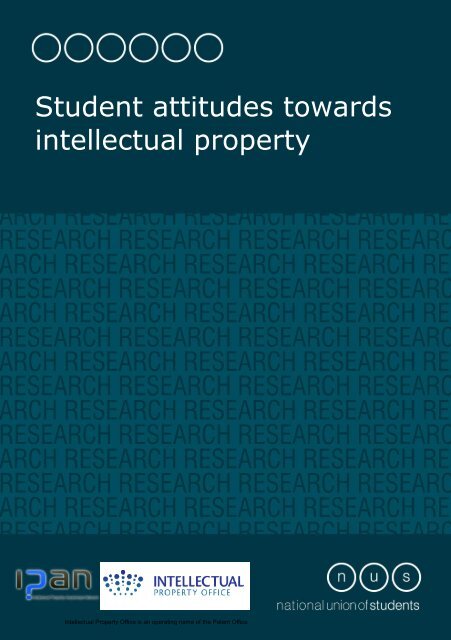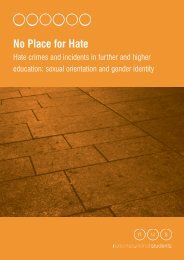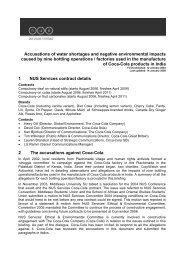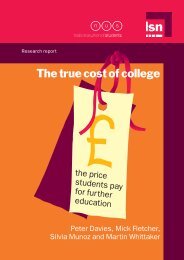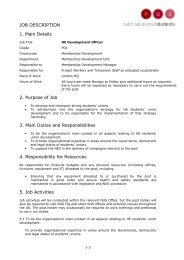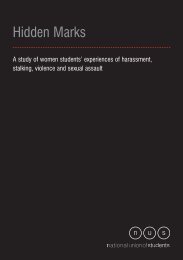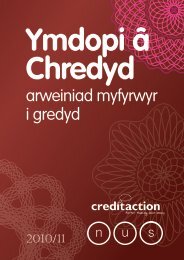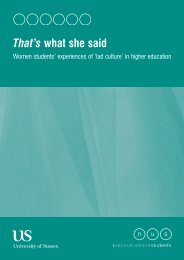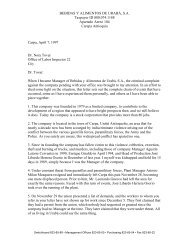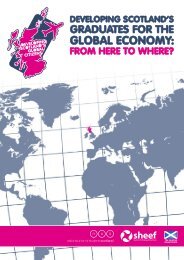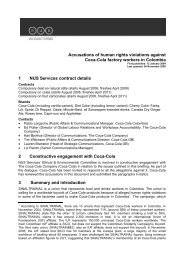Student attitudes towards intellectual property - National Union of ...
Student attitudes towards intellectual property - National Union of ...
Student attitudes towards intellectual property - National Union of ...
You also want an ePaper? Increase the reach of your titles
YUMPU automatically turns print PDFs into web optimized ePapers that Google loves.
<strong>Student</strong> <strong>attitudes</strong> <strong>towards</strong><br />
<strong>intellectual</strong> <strong>property</strong><br />
Subtitle <strong>of</strong> report<br />
Intellectual Property Office is an operating name <strong>of</strong> the Patent Office
<strong>Student</strong> <strong>attitudes</strong> <strong>towards</strong> <strong>intellectual</strong> <strong>property</strong><br />
2
<strong>Student</strong> <strong>attitudes</strong> <strong>towards</strong> <strong>intellectual</strong> <strong>property</strong><br />
Contents<br />
Foreword ............................................................................................ 4<br />
Executive summary ............................................................................ 7<br />
Introduction ..................................................................................... 10<br />
Research design ................................................................................ 13<br />
Research findings<br />
Knowledge <strong>of</strong> IP .............................................................................. 17<br />
Prior knowledge <strong>of</strong> IP ........................................................................ 23<br />
IP within current courses ................................................................... 26<br />
Scenarios ........................................................................................ 34<br />
IP and future careers ........................................................................ 36<br />
Conclusions ...................................................................................... 39<br />
Areas for development ..................................................................... 40<br />
Areas for further research ................................................................. 40<br />
References ....................................................................................... 42<br />
Appendices<br />
Appendix A: Survey questions ........................................................... 44<br />
Appendix B: Survey demographics ..................................................... 52<br />
3
<strong>Student</strong> <strong>attitudes</strong> <strong>towards</strong> <strong>intellectual</strong> <strong>property</strong><br />
Forewords<br />
4
<strong>Student</strong> <strong>attitudes</strong> <strong>towards</strong> <strong>intellectual</strong> <strong>property</strong><br />
Foreword from<br />
NUS<br />
Welcome to the NUS/IPO/IPAN report,<br />
<strong>Student</strong> Attitudes <strong>towards</strong> Intellectual<br />
Property, which provides an insight into<br />
student <strong>attitudes</strong> to, awareness <strong>of</strong>, and<br />
aspirations for, <strong>intellectual</strong> <strong>property</strong> (IP)<br />
education. We are pleased to be working<br />
with the Intellectual Property Office (IPO)<br />
and the Intellectual Property Awareness<br />
Network (IPAN) to produce this research.<br />
It is concerning how little is known about<br />
the <strong>attitudes</strong> and experiences <strong>of</strong> IP<br />
education within the UK student body.<br />
Intellectual <strong>property</strong> is a significant issue<br />
for many UK students, not only for the<br />
successful completion <strong>of</strong> their academic<br />
course, but as importantly, to ensure<br />
students understand how ideas are<br />
recognised and protected, to prepare them<br />
for the growing world <strong>of</strong> enterprise and<br />
innovation beyond graduation.<br />
procedures for protecting their IP rights.<br />
They want IP education to be integrated<br />
into their courses, and linked to their future<br />
career options. Improving IP education in<br />
the UK is a significant challenge, and one<br />
which will require the combined efforts <strong>of</strong><br />
many stakeholders including FE and HE<br />
institutions, pr<strong>of</strong>essional bodies,<br />
government bodies, academics, student<br />
unions and students themselves.<br />
I hope you find this research thoughtprovoking<br />
and informative. As one <strong>of</strong> the<br />
first pieces <strong>of</strong> work to investigate this issue,<br />
this report is clearly just the beginning <strong>of</strong> a<br />
discussion about how IP education in the<br />
UK should be shaped to meet students’<br />
needs and expectations now and in the<br />
future.<br />
Rachel Wenstone<br />
Vice President Higher Education<br />
<strong>National</strong> <strong>Union</strong> <strong>of</strong> <strong>Student</strong>s<br />
This pioneering research shows that<br />
students believe a knowledge <strong>of</strong> IP is<br />
important and those who have some<br />
experience <strong>of</strong> IP education view it positively<br />
and express a desire for more. However,<br />
the extent <strong>of</strong> IP teaching is currently very<br />
limited and many students are not even<br />
aware <strong>of</strong> the potential scope <strong>of</strong> IP education.<br />
Even where it does take place, IP education<br />
is frequently restricted to plagiarism, is not<br />
included in assessment, and makes little<br />
use <strong>of</strong> external experts.<br />
Improvements are clearly needed. This<br />
research indicates that students are<br />
currently not well-informed about the<br />
5
<strong>Student</strong> <strong>attitudes</strong> <strong>towards</strong> <strong>intellectual</strong> <strong>property</strong><br />
Foreword from<br />
IPO<br />
The Intellectual Property Office (IPO) is<br />
delighted to have worked with the <strong>National</strong><br />
<strong>Union</strong> <strong>of</strong> <strong>Student</strong>s (NUS) and the<br />
Intellectual Property Awareness Network<br />
(IPAN) in the production <strong>of</strong> this research.<br />
We have long worked with universities and<br />
industry to assist them in harnessing the<br />
Intellectual Property (IP) derived from the<br />
knowledge and expertise <strong>of</strong> academics and<br />
researchers, but our understanding <strong>of</strong> IP<br />
within the student community has been<br />
somewhat lacking. Thankfully, this report<br />
provides a much needed insight into<br />
students’ awareness <strong>of</strong> IP and their<br />
<strong>attitudes</strong> to IP teaching in UK universities.<br />
all parties to shape curriculum development<br />
to ensure that IP teaching is included in a<br />
wider range <strong>of</strong> courses, in more locations<br />
across the UK to underpin the economic<br />
boost that will flow from maximising the<br />
value <strong>of</strong> UK creativity.<br />
Sean Dennehey<br />
Acting Chief Executive and<br />
Comptroller-General<br />
Intellectual Property Office<br />
An awareness and understanding <strong>of</strong> IP<br />
developed in education is key to achieving<br />
an IP savvy workforce which can use IP to<br />
deliver growth for the UK. What this report<br />
shows is that despite student appetite for IP<br />
knowledge and their desire for career<br />
relevant IP teaching to be integrated into<br />
the curriculum, few university courses<br />
address IP issues. Too <strong>of</strong>ten, our graduates<br />
leave university with little understanding <strong>of</strong><br />
how to protect their ideas or maximise their<br />
value.<br />
Improving the provision <strong>of</strong> IP education<br />
within our universities will require support<br />
and action from a wide range <strong>of</strong><br />
stakeholders from academia, industry and<br />
government. This report will help to focus<br />
attention on the challenge and the benefits<br />
that will flow from addressing it. The IPO is<br />
committed to working in partnership with<br />
6
<strong>Student</strong> <strong>attitudes</strong> <strong>towards</strong> <strong>intellectual</strong> <strong>property</strong><br />
Executive<br />
Chapter<br />
summary<br />
7
<strong>Student</strong> <strong>attitudes</strong> <strong>towards</strong> <strong>intellectual</strong> <strong>property</strong><br />
Executive<br />
summary<br />
This report presents the findings <strong>of</strong> a<br />
quantitative online survey <strong>of</strong> over 2,000 FE<br />
and HE students in the UK. The survey<br />
investigated student <strong>attitudes</strong> to,<br />
awareness <strong>of</strong>, and aspirations for,<br />
<strong>intellectual</strong> <strong>property</strong> (IP) and sought to<br />
understand how the continued student<br />
journey affects demand for information<br />
about IP.<br />
Overwhelmingly, students felt that a<br />
knowledge <strong>of</strong> IP is important to both<br />
their education and their future career.<br />
There is evidence that IP teaching earlier<br />
in their education motivates greater<br />
interest among students at FE/HE level.<br />
Furthermore, once they are exposed to<br />
some aspects <strong>of</strong> IP, students feel more<br />
confident about it, and express a desire to<br />
know more.<br />
<strong>Student</strong>s feel it was important to know<br />
about IP to ensure everyone receives<br />
recognition for their work and ideas, but<br />
they do not perceive a strong link<br />
between IP and commercial success.<br />
Despite expressing high levels <strong>of</strong> confidence<br />
in their ability to perform IP-related tasks,<br />
many students clearly had a limited<br />
understanding <strong>of</strong> areas such as design<br />
rights and copyright.<br />
The extent <strong>of</strong> IP teaching is generally<br />
limited and, where it occurs, it is most<br />
usually integrated throughout HE and FE<br />
courses. While briefings before embarking<br />
on research projects are fairly common,<br />
very few students reported receiving<br />
information about IP before a placement.<br />
Two-fifths <strong>of</strong> students who received IP<br />
education said it is an assessed part <strong>of</strong> their<br />
course.<br />
Academics, and module tutors in particular,<br />
are seen as key sources <strong>of</strong> information<br />
about IP issues. However, just half the<br />
students surveyed felt their lecturers to be<br />
well-informed about IP issues.<br />
Many students want to see improvements<br />
to IP teaching. In particular, they want<br />
the teaching <strong>of</strong> IP issues to be more<br />
closely-related to their course<br />
discipline. They also called for coverage<br />
<strong>of</strong> IP to extend beyond plagiarism. Overall,<br />
only 40% <strong>of</strong> students consider their<br />
current awareness <strong>of</strong> IP to be enough<br />
to support them in their future career.<br />
As the use <strong>of</strong> electronic resources has<br />
expanded in recent years, plagiarism has<br />
become an increasingly important issue<br />
within UK educational institutions,<br />
demonstrated by the use <strong>of</strong> resources such<br />
as Turnitin 1 . This research suggests that,<br />
although a focus on plagiarism has helped<br />
to raise the pr<strong>of</strong>ile <strong>of</strong> IP in academic<br />
institutions, to date this has not been<br />
capitalised on to promote other aspects <strong>of</strong><br />
IP teaching. There is a need for better<br />
support for both academics and students in<br />
learning and teaching about IP.<br />
1 http://submit.ac.uk/en_gb/home<br />
8
<strong>Student</strong> <strong>attitudes</strong> <strong>towards</strong> <strong>intellectual</strong> <strong>property</strong><br />
This project has demonstrated that there<br />
are important insights to be gained through<br />
work in this under-researched area. There<br />
is a need for further studies with the<br />
student population to investigate the<br />
complex issues raised, as well as research<br />
with other stakeholders (eg academics,<br />
business community), and longitudinal<br />
studies to track changing <strong>attitudes</strong> and<br />
awareness among students.<br />
9
<strong>Student</strong> <strong>attitudes</strong> <strong>towards</strong> <strong>intellectual</strong> <strong>property</strong><br />
Introduction<br />
The overarching aim <strong>of</strong> the research was to<br />
carry out quantitative empirical research<br />
into student <strong>attitudes</strong> to, and awareness<br />
<strong>of</strong>, <strong>intellectual</strong> <strong>property</strong> (IP) and<br />
understand how the continued student<br />
journey affects demand, if at all, for<br />
information on IP, to include patents,<br />
copyright, trade marks, designs and<br />
confidentiality.<br />
10
<strong>Student</strong> <strong>attitudes</strong> <strong>towards</strong> <strong>intellectual</strong> <strong>property</strong><br />
Introduction<br />
This research was commissioned by the<br />
Intellectual Property Office (IPO) and the<br />
Education Group <strong>of</strong> the Intellectual Property<br />
Awareness Network (IPAN) 2 . IPO and IPAN<br />
are both concerned with raising awareness<br />
<strong>of</strong> <strong>intellectual</strong> <strong>property</strong> (IP) and improving<br />
IP competence in the UK workforce. Whilst<br />
research has been conducted amongst<br />
various contributors to the UK economy,<br />
little is known about <strong>attitudes</strong> and<br />
experience <strong>of</strong> IP amongst the UK student<br />
body.<br />
This quantitative research investigates<br />
student <strong>attitudes</strong> to, awareness <strong>of</strong>, and<br />
aspirations for, IP in the Higher Education<br />
(HE) and Further Education (FE) contexts,<br />
and seeks to understand how the continued<br />
student journey affects demand, if at all,<br />
for information on IP, to include patents,<br />
copyright, trade marks, designs and<br />
confidentiality. The research draws together<br />
existing knowledge to inform a future facing<br />
survey with current students in HE and FE<br />
to demonstrate the level <strong>of</strong> delivery <strong>of</strong>, and<br />
demand, if any, for specific curricular<br />
inclusion <strong>of</strong> IP.<br />
There are currently 7 million students in the<br />
UK. Methods <strong>of</strong> studying have evolved with<br />
2 The IP Awareness Network (IPAN: www.ipaware.net)<br />
includes a broad range <strong>of</strong> pr<strong>of</strong>essional, educational and<br />
business organisations all interested in improving<br />
understanding and awareness <strong>of</strong> IP in the UK. IPAN<br />
channels its activities through its sector workgroups<br />
which focus on promoting awareness OF IP for those<br />
involved in Finance and Business, Parliament and<br />
Education. IPAN’s involvement in the current report<br />
stems from its Education Workgroup.<br />
social and technological changes, as well as<br />
changes in pedagogy leading to new course<br />
delivery and assessment formats. The<br />
ways in which individual students are able<br />
to learn has changed accordingly, leading to<br />
a rich field <strong>of</strong> output types each with its<br />
own unique implications for IP.<br />
Aims and objectives<br />
The overarching aim <strong>of</strong> investigating<br />
student <strong>attitudes</strong> <strong>towards</strong>, awareness <strong>of</strong>,<br />
and aspirations for, IP can be broken down<br />
into the following six objectives:<br />
<br />
<br />
<br />
<br />
<br />
<br />
To understand the inclusion <strong>of</strong> IP<br />
within the curriculum<br />
To scale the degree to which<br />
students personally consider the<br />
implications <strong>of</strong> IP<br />
To discover in what contexts<br />
students are engaged with IP, and<br />
how they engage – e.g. which<br />
resources are they using, from<br />
which bodies?<br />
To determine the impact <strong>of</strong><br />
knowledge <strong>of</strong> IP in schools and FE,<br />
and the perceived value <strong>of</strong> this<br />
knowledge during and after<br />
university<br />
To discover what aspirations<br />
students have, if any, to learn more<br />
about IP<br />
To capture perceptions for the future<br />
value, need and use <strong>of</strong> IP amongst<br />
students.<br />
11
<strong>Student</strong> <strong>attitudes</strong> <strong>towards</strong> <strong>intellectual</strong> <strong>property</strong><br />
IP delivery in the HE sector<br />
The current climate regarding IP in the UK<br />
HE sector has been described as “both<br />
confused and confusing” (Joint, 2006).<br />
Within law schools, although IP is a relative<br />
newcomer to the range <strong>of</strong> subjects <strong>of</strong>fered,<br />
the majority <strong>of</strong> HE institutions have at least<br />
one academic with a declared interest in IP<br />
and the subject now forms part <strong>of</strong> most law<br />
degree programmes in the UK (Booton and<br />
Prime, 2002 [unpublished], in Soetendorp,<br />
2006). Although there is growing<br />
recognition <strong>of</strong> the importance <strong>of</strong> students<br />
being aware <strong>of</strong> protecting, exploiting and<br />
enforcing IP rights beyond law schools,<br />
non-law academics have not always been<br />
enthusiastic about introducing IP into the<br />
curriculum (Soetendorp, 2002). In contrast<br />
to negative <strong>attitudes</strong> among many<br />
academics, in small scale surveys, students<br />
have been found to respond positively to IP<br />
as being relevant to their future careers<br />
(Soetendorp, 2006).<br />
Some research has been conducted into IP<br />
delivery as part <strong>of</strong> engineering courses. A<br />
survey <strong>of</strong> UK engineering faculties in 2005<br />
found that IP featured on courses, but ‘not<br />
at a high level’. It was most frequently<br />
delivered by an external speaker (eg a<br />
lawyer), in conjunction with a member <strong>of</strong><br />
the faculty. IP was a small element <strong>of</strong><br />
assessed work in about 30% <strong>of</strong> cases and<br />
case studies and lecture notes were the<br />
most popular resources used. (Roach &<br />
Soetendorp, 2008)<br />
12
<strong>Student</strong> <strong>attitudes</strong> <strong>towards</strong> <strong>intellectual</strong> <strong>property</strong><br />
Research<br />
design<br />
Following an information exchange session,<br />
a quantitative online survey was designed<br />
to capture FE and HE students’ <strong>attitudes</strong><br />
to, awareness <strong>of</strong>, and aspirations for, the<br />
delivery <strong>of</strong> IP<br />
13
<strong>Student</strong> <strong>attitudes</strong> <strong>towards</strong> <strong>intellectual</strong> <strong>property</strong><br />
Research design<br />
An online survey was designed to target<br />
50,000 students in HE and FE institutions,<br />
to obtain a nationally representative<br />
student demographic from across the UK.<br />
This survey explored student <strong>attitudes</strong> to,<br />
awareness <strong>of</strong>, and aspirations for, the<br />
delivery <strong>of</strong> an adequate competence in IP in<br />
order to meet their career aims.<br />
The flow diagram below outlines the<br />
themes covered by the survey. A copy <strong>of</strong><br />
the survey is included in Appendix A.<br />
2,146 responses were received. 69%<br />
(1,473) <strong>of</strong> students responding were female<br />
and 31% (664) were male. The median<br />
age <strong>of</strong> respondents was 22. The majority<br />
(59% or 1,267) were in the first year <strong>of</strong><br />
their course and approximately threequarters<br />
were from HE institutions, with the<br />
remainder studying in FE. Just over half<br />
(56% or 1,196) were studying for a Level<br />
4-6 qualification (undergraduate level).<br />
29% (622) were part-time students and<br />
there was a wide distribution between<br />
university mission groups and subjects<br />
studied. The most common subjects<br />
studied were social studies (13%),<br />
language literature, linguistics and classics<br />
(10%) and business and administration<br />
(10%). Further details <strong>of</strong> the demographics<br />
<strong>of</strong> respondents are provided in Appendix B.<br />
Figure 1: Flow diagram <strong>of</strong> survey questions<br />
14
<strong>Student</strong> <strong>attitudes</strong> <strong>towards</strong> <strong>intellectual</strong> <strong>property</strong><br />
A project steering group consisting <strong>of</strong> the<br />
Intellectual Property Office (IPO),<br />
Intellectual Property Awareness Network<br />
(IPAN), NUS and NUS Services met<br />
regularly throughout the project to steer<br />
the research at key points, such as project<br />
initiation, survey design and analysis 3 .<br />
Analysis<br />
Initially, the responses were analysed to<br />
provide summary statistics for each<br />
question. These are presented using<br />
descriptive charts, and percentages and<br />
counts. In addition, inferential statistics<br />
were calculated, for example, comparing<br />
results by year group, discipline, mission<br />
group, previous institution type and other<br />
relevant factors. The results <strong>of</strong> this<br />
analysis are reported where noteworthy<br />
differences were found between the groups.<br />
Tests for association between variables<br />
were calculated using the chi-squared test<br />
for nominal/categorical data. Where<br />
evidence <strong>of</strong> a relationship was found, the<br />
significance level is given, and a cautionary<br />
note if a high percentage <strong>of</strong> the cells had an<br />
expected value <strong>of</strong> less than five 4 .<br />
3 Steering group members were Ruth Soetendorp and<br />
Graham Barber (IPAN Education Group), Steve Smith<br />
(IPAN), Matthew Larreta and David Humphries (IPO),<br />
Debbie McVitty (NUS).<br />
4 It is generally advised that not more than 20% <strong>of</strong><br />
cells should have values less than 5.<br />
15
<strong>Student</strong> <strong>attitudes</strong> <strong>towards</strong> <strong>intellectual</strong> <strong>property</strong><br />
Research<br />
findings<br />
The findings are presented under the<br />
themes: knowledge <strong>of</strong> IP, prior knowledge<br />
<strong>of</strong> IP, IP with current courses, scenarios,<br />
and IP and future careers.<br />
16
<strong>Student</strong> <strong>attitudes</strong> <strong>towards</strong> <strong>intellectual</strong> <strong>property</strong><br />
Knowledge <strong>of</strong> IP<br />
responses included more than one aspect <strong>of</strong><br />
IP.<br />
The section <strong>of</strong> the survey explored students’<br />
existing understanding and knowledge <strong>of</strong> IP.<br />
When asked about their understanding <strong>of</strong><br />
the phrase ‘<strong>intellectual</strong> <strong>property</strong>’, 1,368<br />
respondents gave answers which showed<br />
an understanding <strong>of</strong> at least some aspects<br />
<strong>of</strong> the term. The remaining 233 (15%)<br />
responses did not indicate an<br />
understanding <strong>of</strong> any aspects <strong>of</strong> IP. It<br />
should be noted that, although many<br />
students clearly attempted to construct<br />
their own definitions, a number answered<br />
this question by copying definitions <strong>of</strong> IP<br />
from internet sources.<br />
While some responses focused on broad<br />
concepts, such as ownership (25.0%),<br />
rights (8.8%) and originality (4.9%), others<br />
mentioned more specific terms such as<br />
copyright (18.4%), patents (7.5%) and<br />
trade marks (5.3%). Naturally, many<br />
In addition to the more common responses,<br />
it is worth noting the aspects <strong>of</strong> IP which<br />
were only mentioned by a small number <strong>of</strong><br />
students, for example, design rights (1%),<br />
trade secrets (0.3%) and brands (1%).<br />
Some <strong>of</strong> the many answers focusing on the<br />
notion <strong>of</strong> ownership <strong>of</strong> ideas included:<br />
”a non-material ‘<strong>property</strong>’,<br />
something that you own but doesn't<br />
exist in a material form, ideas”<br />
“I believe <strong>intellectual</strong> <strong>property</strong> to be<br />
the right a person has to ownership<br />
to his/her unique ideas”.<br />
Other students referred to ideas or<br />
creations in general terms, but did not link<br />
this to ownership:<br />
“something created in the mind: a<br />
design/idea”.<br />
What is your understanding <strong>of</strong> the phrase '<strong>intellectual</strong> <strong>property</strong>', if any? (n=1601)<br />
Ownership <strong>of</strong> ideas (n=400)<br />
Copyright (n=295)<br />
Concepts, ideas and creations (n=178)<br />
Rights (n=141)<br />
Patents (n=120)<br />
Legal term (n=90)<br />
Trademarks (n=85)<br />
Originality (n=78)<br />
Value (n=60)<br />
Protection (n=47)<br />
Prevents reproduction without permission (n=35)<br />
Should be referenced (n=22)<br />
Brands (n=15)<br />
Design rights (n=14)<br />
Registration (n=9)<br />
Published or made public (n=7)<br />
Licensing (n=6)<br />
Trade secrets (n=5)<br />
6%<br />
5%<br />
5%<br />
4%<br />
3%<br />
2%<br />
1%<br />
1%<br />
1%<br />
1%<br />
0.4%<br />
0.4%<br />
0.3%<br />
9%<br />
7%<br />
11%<br />
18%<br />
25%<br />
17
<strong>Student</strong> <strong>attitudes</strong> <strong>towards</strong> <strong>intellectual</strong> <strong>property</strong><br />
<strong>Student</strong>s were given a list <strong>of</strong> topics and<br />
asked to select all those they thought were<br />
relevant to IP. The topic recognised as<br />
relevant by the greatest number <strong>of</strong><br />
respondents was ‘understanding the<br />
implications <strong>of</strong> copyright restrictions’, but<br />
even this was only thought to be relevant<br />
by 75%.<br />
Notably, understanding the implications <strong>of</strong><br />
disclosure and exploiting ideas<br />
commercially were recognised as relevant<br />
by the fewest numbers <strong>of</strong> students; in each<br />
case, less than half the respondents felt<br />
these were relevant to IP.<br />
18
<strong>Student</strong> <strong>attitudes</strong> <strong>towards</strong> <strong>intellectual</strong> <strong>property</strong><br />
The importance <strong>of</strong> IP topics<br />
<strong>Student</strong>s were given a list <strong>of</strong> reasons why<br />
they may want to know about IP and asked<br />
to rate the importance <strong>of</strong> each.<br />
The most important reasons for knowing<br />
about IP were concerned with ensuring that<br />
everyone receives recognition for work and<br />
ideas; at least 80% believed it is important<br />
or very important to know about IP in order<br />
to ‘access and use other people’s work<br />
appropriately’, ‘make sure everyone<br />
receives recognition for collaborative work’<br />
and to ‘ensure I gain recognition for my<br />
ideas’.<br />
The commercial exploitation <strong>of</strong> ideas was<br />
the reason seen as least important overall<br />
(only 53% rated it important). This is<br />
noteworthy considering the current<br />
emphasis on innovation, enterprise and<br />
growth within the university sector (PACEC,<br />
2012).<br />
Interestingly, it was not only law students<br />
who believed IP to be important to ‘enable<br />
me to inform others about the value and<br />
management <strong>of</strong> IP’; business studies,<br />
engineering and technology and law<br />
students also felt this important.<br />
There was evidence <strong>of</strong> a relationship at a<br />
very high statistical significance level (0.01)<br />
between the importance <strong>of</strong> knowing about<br />
IP ‘to make myself more employable’ and<br />
students’ current, and prior, learning about<br />
IP. <strong>Student</strong>s who had learned about designs,<br />
19
<strong>Student</strong> <strong>attitudes</strong> <strong>towards</strong> <strong>intellectual</strong> <strong>property</strong><br />
design rights and trade marks were most<br />
like to believe this was important. Those<br />
who had not learned about IP previously<br />
were less likely to feel this was important<br />
than those who had studied IP in the past,<br />
particularly at A/AS or primary level. Those<br />
who had studied IP before were also more<br />
likely to believe knowing about IP was<br />
important in order to pass their course<br />
assessment at the same high statistical<br />
significance level (0.01).<br />
When it came to appreciating the<br />
importance <strong>of</strong> IP knowledge in order to<br />
exploit ideas commercially, current and<br />
prior learning about IP, and subject studied,<br />
appeared to be influential factors. <strong>Student</strong>s<br />
who had studied designs, design rights and<br />
trade marks on their current course were<br />
most likely to see this as important, while<br />
those who had been taught about<br />
plagiarism, or not studied any aspects <strong>of</strong> IP,<br />
were least likely. Those who had studied IP<br />
prior to their current course were also more<br />
likely to see the possibility <strong>of</strong> commercial<br />
exploitation as important, as were those<br />
currently studying technologies,<br />
engineering and business. For each <strong>of</strong><br />
these three variables, there was evidence<br />
<strong>of</strong> a relationship at a high statistical<br />
significance level (0.01).<br />
<strong>Student</strong>s were also asked about the<br />
importance they attributed to learning<br />
about IP generally during their time in<br />
education. 82% thought it was important<br />
or very important. Only 3% thought it was<br />
unimportant.<br />
Around the same figure, 80%, felt that<br />
knowing about IP was important for their<br />
future career.<br />
20
<strong>Student</strong> <strong>attitudes</strong> <strong>towards</strong> <strong>intellectual</strong> <strong>property</strong><br />
Confidence in performing<br />
IP tasks<br />
When asked about their level <strong>of</strong> confidence<br />
in performing various IP-related tasks,<br />
overall, students felt most confident in<br />
understanding the implications <strong>of</strong> disclosure<br />
and confidentiality (68% confident or very<br />
confident) and knowing the implications <strong>of</strong><br />
using someone else’s <strong>intellectual</strong> <strong>property</strong><br />
(59%). They were generally least confident<br />
in understanding how to use patent<br />
information (31%), understanding how not<br />
to be taken advantage <strong>of</strong> in IP matters<br />
(32%) and communicating effectively with<br />
an IP pr<strong>of</strong>essional (33%).<br />
There was a relationship, significant at a<br />
high level <strong>of</strong> statistical significance (0.01),<br />
between confidence levels and subjects<br />
studied. <strong>Student</strong>s who were studying law,<br />
technologies, engineering or business were<br />
most confident in performing these tasks,<br />
while those studying arts or humanities<br />
subjects felt least confident.<br />
21
<strong>Student</strong> <strong>attitudes</strong> <strong>towards</strong> <strong>intellectual</strong> <strong>property</strong><br />
There was also a relationship, at a high<br />
level <strong>of</strong> statistical significance (0.01)<br />
between confidence and prior learning, with<br />
students who had learned about IP at<br />
primary level or when studying for a<br />
vocational qualification, being most<br />
confident in performing IP-related tasks,<br />
while those who had not studied IP<br />
previously were least confident.<br />
22
<strong>Student</strong> <strong>attitudes</strong> <strong>towards</strong> <strong>intellectual</strong> <strong>property</strong><br />
Prior knowledge<br />
<strong>of</strong> IP<br />
More than half (57%) the students<br />
responding to the survey said they had<br />
never learned about IP issues before their<br />
current place <strong>of</strong> study. Among those who<br />
had, most had done so whilst studying for<br />
A/AS levels (19%) or GCSEs (14%).<br />
In addition to the options given,<br />
respondents said they had learned about IP<br />
during employment (1%) and through self<br />
study (
<strong>Student</strong> <strong>attitudes</strong> <strong>towards</strong> <strong>intellectual</strong> <strong>property</strong><br />
Unsurprisingly, the IP topic the greatest<br />
number <strong>of</strong> students remembered learning<br />
about at their previous place <strong>of</strong> study was<br />
plagiarism (71%). This was followed by<br />
copyright (65%), with confidentiality (39%),<br />
trade marks (35%) and patents (32%) also<br />
featuring strongly.<br />
56% <strong>of</strong> those who had previous learned<br />
about IP issues (or 24% <strong>of</strong> the entire<br />
sample) felt they had a reasonable<br />
knowledge <strong>of</strong> IP from their previous place<br />
<strong>of</strong> study, knowing all or some <strong>of</strong> what they<br />
needed for their current course. But 10%<br />
<strong>of</strong> those who had learned about IP<br />
previously felt they knew ‘almost nothing’.<br />
24
<strong>Student</strong> <strong>attitudes</strong> <strong>towards</strong> <strong>intellectual</strong> <strong>property</strong><br />
When asked about ways in which the<br />
delivery <strong>of</strong> IP at their previous place <strong>of</strong><br />
study could have been improved, 40% <strong>of</strong><br />
students wanted topics to be covered in<br />
more detail, and 27% wanted to see<br />
additional topics covered. Additional topics<br />
which students felt would improve delivery<br />
included patents (24 responses) and<br />
copyright (19 responses). The main topics<br />
students would like to see covered in more<br />
detail were copyright (27); referencing and<br />
plagiarism (26); and patents (22).<br />
There was disagreement about the ideal<br />
timing for IP delivery; some thought IP<br />
should feature at the beginning <strong>of</strong> a course,<br />
while others felt it should be covered later<br />
on. The most common suggestions for<br />
outside speakers were lawyers (8) and<br />
pr<strong>of</strong>essionals (12).<br />
The most common ‘other’ suggested<br />
improvement was to include something on<br />
IP as coverage was currently so limited.<br />
25
<strong>Student</strong> <strong>attitudes</strong> <strong>towards</strong> <strong>intellectual</strong> <strong>property</strong><br />
IP within current<br />
courses<br />
When students were asked which IP topics<br />
had been included as part <strong>of</strong> their current<br />
course, plagiarism was, by far, the most<br />
common response (73%). This is, perhaps,<br />
not surprising given the emphasis on the<br />
prevention <strong>of</strong> plagiarism within the sector in<br />
recent years, for example, all UK HE<br />
institutions have plagiarism prevention<br />
processes which includes some form <strong>of</strong><br />
guidance or training for students. This was<br />
followed by copyright (35%) and<br />
confidentiality (30%). <strong>National</strong> and<br />
international IP issues (5%), getting advice<br />
on IP matters (6%) and performing (6%)<br />
and design (7%) rights were the topics<br />
least likely to be included. This pattern was<br />
similar across universities in all mission<br />
groups.<br />
As might be expected, there was variation<br />
in the topics taught within different subject<br />
disciplines.<br />
<br />
<br />
<br />
<br />
<br />
<br />
<br />
Patents and trade marks were most<br />
likely to feature in law, business and<br />
engineering courses;<br />
confidentiality was most likely to<br />
appear in medicine courses;<br />
design rights most commonly<br />
featured in engineering, creative<br />
arts and architecture courses;<br />
designs were most <strong>of</strong>ten part <strong>of</strong><br />
engineering and creative arts<br />
courses;<br />
performing rights were most<br />
common in creative arts, mass<br />
media and law courses;<br />
publishing and IP featured most in<br />
history and mass media courses;<br />
open source licensing was most<br />
common in technology and maths &<br />
computing courses.<br />
26
<strong>Student</strong> <strong>attitudes</strong> <strong>towards</strong> <strong>intellectual</strong> <strong>property</strong><br />
IP delivery<br />
40% <strong>of</strong> students who received IP education<br />
said that IP issues were integrated<br />
throughout their course. The other<br />
common ways for IP to be taught were in a<br />
briefing before a research project (30%), or<br />
within another module (23%).<br />
In addition to the options given, a small<br />
number <strong>of</strong> students (65, or 4% <strong>of</strong> those<br />
responding) said they learned about IP by<br />
using their course handbook.<br />
common as part <strong>of</strong> law courses, while<br />
briefings were most <strong>of</strong>ten a feature <strong>of</strong><br />
medical courses.<br />
Where courses included some aspects <strong>of</strong> IP,<br />
these were most usually delivered within<br />
the student’s department, by the module<br />
tutor (69%) or another lecturer from the<br />
department (26%). There was limited<br />
involvement from other university<br />
departments (eg law) or services (eg<br />
knowledge transfer).<br />
Teaching methods varied by discipline, for<br />
example, discrete modules were most<br />
27
<strong>Student</strong> <strong>attitudes</strong> <strong>towards</strong> <strong>intellectual</strong> <strong>property</strong><br />
Lectures were the most common resource<br />
students used to learn about IP (45%),<br />
followed by course handouts (34%).<br />
However, there is evidence <strong>of</strong> some more<br />
active learning methods being used as 28%<br />
said they learned about IP through<br />
independent study and 12% had used webbased<br />
resources, such as the IPO website.<br />
Two-fifths <strong>of</strong> respondents who had learned<br />
about IP said this was not assessed as part<br />
<strong>of</strong> their course. Where IP knowledge was<br />
assessed, individual coursework task was<br />
the most common method.<br />
28
<strong>Student</strong> <strong>attitudes</strong> <strong>towards</strong> <strong>intellectual</strong> <strong>property</strong><br />
Improvements to IP<br />
delivery<br />
More than half <strong>of</strong> the students who had<br />
been taught about IP as part <strong>of</strong> their course<br />
(53%) wanted IP issues to be more closely<br />
linked to the subject they were studying.<br />
Additional comments indicated that<br />
students feel there is very limited coverage<br />
<strong>of</strong> IP on current courses, so any additional<br />
teaching would be welcome:<br />
“Hardly anything is taught about<br />
<strong>intellectual</strong> <strong>property</strong> and so it could be<br />
useful to go into more detail.”<br />
“Intellectual <strong>property</strong> should be a topic<br />
in its own right as most students have<br />
no idea that they have rights in regards<br />
to the work they produce and the ideas<br />
the put forward.”<br />
“Most <strong>of</strong> the information about<br />
<strong>intellectual</strong> <strong>property</strong> has been very<br />
brief and just giving a quick overview<br />
more detail would be better”.<br />
Overwhelmingly, students who responded<br />
to this question wanted information about<br />
IP issues to be delivered during the early<br />
stages <strong>of</strong> their course:<br />
“Delivering information about issues<br />
regarding <strong>intellectual</strong> <strong>property</strong>, such as<br />
plagiarism, from the very beginning <strong>of</strong><br />
the course. This would be important in<br />
future coursework and essays”<br />
“We should learn about <strong>intellectual</strong><br />
<strong>property</strong> issues within the first year <strong>of</strong><br />
the course, rather than just before the<br />
final year project.”<br />
“We just covered plagiarism, so<br />
everything else!”<br />
29
<strong>Student</strong> <strong>attitudes</strong> <strong>towards</strong> <strong>intellectual</strong> <strong>property</strong><br />
<strong>Student</strong>s were asked which topics they felt<br />
were appealing to be included as part <strong>of</strong><br />
their course. The topics with the widest<br />
appeal were those which would be<br />
immediately relevant to the majority <strong>of</strong><br />
students, such as a general overview <strong>of</strong> IP,<br />
and topics concerned with academic writing<br />
and publishing, including plagiarism.<br />
The least appealing were more detailed<br />
topics, or those which might only be<br />
immediately relevant to a minority <strong>of</strong><br />
students (eg performing rights). However,<br />
it is noteworthy that even these less<br />
popular options were deemed unappealing<br />
by less than one-fifth <strong>of</strong> students<br />
responding.<br />
Unappealing<br />
Appealing<br />
Unappealing<br />
Appealing<br />
30
<strong>Student</strong> <strong>attitudes</strong> <strong>towards</strong> <strong>intellectual</strong> <strong>property</strong><br />
Support with IP issues<br />
Almost all students were able to identify<br />
some resources they had used for help with<br />
IP issues. Institutional resources were the<br />
most frequently used, particularly course<br />
lecturers (59%), but also other university<br />
services such as knowledge transfer <strong>of</strong>fices<br />
(20%). There was limited use <strong>of</strong> external<br />
resources, but <strong>of</strong> these, the most<br />
commonly used was the British Library<br />
(9%). In addition to the options provided,<br />
4% <strong>of</strong> students said they used the internet,<br />
and others mentioned family, friends and<br />
other acquaintances.<br />
The order <strong>of</strong> resources was broadly the<br />
same when students were asked which<br />
resources they were likely to use if they<br />
needed help with IP issues in the future.<br />
Again, lecturers were the resource most<br />
likely to be used (75%) but almost twothirds<br />
<strong>of</strong> respondents (63%) were likely to<br />
use other university services, and just<br />
under a third said they were likely to use<br />
key external resources, the British Library<br />
(31%) or IPO (29%).<br />
31
<strong>Student</strong> <strong>attitudes</strong> <strong>towards</strong> <strong>intellectual</strong> <strong>property</strong><br />
Given students’ reliance on lecturers for<br />
help with IP issues, it is worrying that only<br />
half (52%) felt their lectures were wellinformed<br />
about IP, with just 18% believing<br />
their lecturers to be very well-informed.<br />
32
<strong>Student</strong> <strong>attitudes</strong> <strong>towards</strong> <strong>intellectual</strong> <strong>property</strong><br />
Those studying law, engineering and<br />
technologies were most likely to say their<br />
lecturers were well-informed, while those<br />
studying medicine were least likely to<br />
believe their lectures were well-informed 5 .<br />
Overall, two-fifths <strong>of</strong> respondents felt that<br />
most lecturers in their department viewed<br />
IP as an important issue. However, almost<br />
a third (30%), said they did not know how<br />
their lecturers viewed IP.<br />
Those who had been taught about IP by<br />
their module tutor or another member <strong>of</strong><br />
the department were more likely to believe<br />
that the majority <strong>of</strong> academics view IP as<br />
important 6 .<br />
5 This relationship was statistically significant at the<br />
0.05 level, but due to the low number <strong>of</strong> respondents<br />
for some subjects, more than 20% <strong>of</strong> the cells had an<br />
expected value <strong>of</strong> less than 5, so this should be<br />
treated with caution.<br />
6 There is evidence <strong>of</strong> a relationship between delivery<br />
<strong>of</strong> IP and impressions <strong>of</strong> academics in their<br />
department, significant at the 0.01 level.<br />
33
<strong>Student</strong> <strong>attitudes</strong> <strong>towards</strong> <strong>intellectual</strong> <strong>property</strong><br />
Scenarios<br />
Survey respondents were presented with a<br />
series <strong>of</strong> IP scenarios they might typically<br />
face as a student. The scenarios had been<br />
developed with the Steering Group to<br />
evaluate student understanding <strong>of</strong> practical<br />
aspects <strong>of</strong> IP. They were asked how they<br />
might react in each <strong>of</strong> the situations<br />
presented.<br />
Scenario 1: Imagine you have created<br />
a new invention and want to tell other<br />
people about it. Which <strong>of</strong> the following<br />
would you be most likely to do?<br />
In this situation, just over two-thirds (67%<br />
or 1,431) said they would make sure their<br />
patent was approved before publishing.<br />
Just over one-quarter (26% or 556) said<br />
they would file a patent claim before<br />
publishing, while just 7% (138) said they<br />
would publish and then file a patent claim.<br />
This indicates that many students are<br />
aware <strong>of</strong> the necessity to protect the patent<br />
but they are not aware <strong>of</strong> IPO procedures<br />
to do so.<br />
Scenario 2: Imagine you have written<br />
words and music for a song, which you<br />
want to sell to a record company.<br />
Which <strong>of</strong> the following would you be<br />
most likely to do?<br />
In this situation, more than half <strong>of</strong> students<br />
(51% or 1,082) said they would record the<br />
song on a CD and send it to a record<br />
company. 30% (625) said they would<br />
record the song, mail it to themselves and<br />
keep it in a safe place and 19% (411)<br />
would record it and post it on YouTube.<br />
While some students may have been<br />
confused by the wording <strong>of</strong> this question,<br />
the responses suggest that a relatively<br />
small proportion <strong>of</strong> students are aware <strong>of</strong><br />
the most appropriate action in this situation.<br />
Scenario 3: Imagine you are a fashion<br />
student who designs new and original<br />
amazing hats. Which <strong>of</strong> the following<br />
would you be most likely to do?<br />
In this scenario, 70% (1,480) said they<br />
would register the design with the<br />
Intellectual Property Office (IPO). 22%<br />
(469) would take photographs <strong>of</strong> the hat<br />
and put them on their website. Although<br />
registering the design at the IPO was a<br />
correct answer, it would involve payment <strong>of</strong><br />
a fee. Only 8% (171) were aware that it<br />
was possible to do nothing and rely on<br />
unregistered design right which could then<br />
be asserted if they found the hat being<br />
copied.<br />
Scenario 4: Imagine you are a product<br />
design student who is expected to find<br />
a company to sponsor your final year<br />
innovative design project. Which <strong>of</strong> the<br />
following would you be most likely to<br />
do?<br />
<strong>Student</strong>s were aware they should exercise<br />
caution in this situation. Responses were<br />
divided between those who would write to<br />
several companies asking for a meeting to<br />
discuss their design in confidence (47% or<br />
995), and those who would write to several<br />
companies asking whether they would be<br />
interested in sponsoring their project (45%<br />
34
<strong>Student</strong> <strong>attitudes</strong> <strong>towards</strong> <strong>intellectual</strong> <strong>property</strong><br />
or 958). Fortunately, just 8% (174) said<br />
they would write to several companies<br />
sending full details <strong>of</strong> their design.<br />
Scenario 5: You have developed a web<br />
based catering service that students<br />
are interested in using. What name<br />
will be a good trade mark? Which <strong>of</strong><br />
the following would you be most likely<br />
to choose?<br />
In this case, more than half (57% or 1,231)<br />
rightly said they would choose something<br />
distinctive. 36% (758) said they would opt<br />
for something descriptive <strong>of</strong> their product,<br />
but just 7% (144) would choose something<br />
similar to a well-known mark.<br />
Overall, the responses to the scenarios<br />
suggest that students’ depth <strong>of</strong> practical<br />
understanding is limited. Whilst they have<br />
some awareness <strong>of</strong> the most sensible<br />
options in relation to some IP issues, they<br />
lack detailed knowledge<br />
35
<strong>Student</strong> <strong>attitudes</strong> <strong>towards</strong> <strong>intellectual</strong> <strong>property</strong><br />
IP and future<br />
careers<br />
More than three-quarters <strong>of</strong> students<br />
(77%) believed an awareness <strong>of</strong> IP to be<br />
relevant for them in their future career, and<br />
just 13% did not feel it was relevant.<br />
There is evidence <strong>of</strong> a relationship,<br />
statistically significant at a high level (0.01),<br />
between how relevant students consider an<br />
awareness <strong>of</strong> IP to be for their future career<br />
and the subject they are studying. Mass<br />
communication, law, technologies and<br />
engineering students were most likely to<br />
feel an awareness <strong>of</strong> IP was relevant to<br />
their future careers, while those studying<br />
education were most likely to say it was not<br />
relevant.<br />
Only 40% <strong>of</strong> students said they considered<br />
their awareness and understanding <strong>of</strong> IP to<br />
be enough to support them in their future<br />
career, and 33% actively disagreed with<br />
the statement, saying they did not believe<br />
their awareness and understanding <strong>of</strong> IP to<br />
be sufficient.<br />
Again, there was evidence <strong>of</strong> a statistically<br />
significant difference at a high level (0.01)<br />
for those studying different subjects, with<br />
technologies, engineering and business<br />
students most confident that their<br />
awareness <strong>of</strong> understanding <strong>of</strong> IP was<br />
sufficient, and creative arts, mass<br />
communication and medical students<br />
feeling less confident overall. There was<br />
also a statistically significant relationship<br />
(0.01) between awareness and<br />
understanding <strong>of</strong> IP to support their future<br />
career and IP issues taught on students’<br />
current course. Those who had received no<br />
IP teaching were least confident they were<br />
prepared for their future career, while<br />
getting advice on IP matters and national<br />
and international IP issues were topics<br />
which seemed to make students feel more<br />
confident.<br />
36
<strong>Student</strong> <strong>attitudes</strong> <strong>towards</strong> <strong>intellectual</strong> <strong>property</strong><br />
37
<strong>Student</strong> <strong>attitudes</strong> <strong>towards</strong> <strong>intellectual</strong> <strong>property</strong><br />
Conclusions<br />
In addition to general conclusions about<br />
students’ <strong>attitudes</strong> <strong>towards</strong>, awareness <strong>of</strong>,<br />
and future aspirations for IP delivery, this<br />
research suggests a number <strong>of</strong> areas for<br />
further development and also for future<br />
research.<br />
38
<strong>Student</strong> <strong>attitudes</strong> <strong>towards</strong> <strong>intellectual</strong> <strong>property</strong><br />
Conclusions<br />
greater interest among students at<br />
FE/HE level.<br />
This quantitative survey <strong>of</strong> over 2,000 FE<br />
and HE students in the UK provides a<br />
number <strong>of</strong> important insights into current<br />
student <strong>attitudes</strong> <strong>towards</strong>, and awareness<br />
<strong>of</strong>, IP and highlights valuable lessons for<br />
academics, institutional support services<br />
(eg knowledge transfer <strong>of</strong>fices) and<br />
pr<strong>of</strong>essional organisations in the sector. It<br />
also raises a number <strong>of</strong> complex issues<br />
which are worthy <strong>of</strong> further research.<br />
Overwhelmingly, students believe a<br />
knowledge <strong>of</strong> IP is important, not only<br />
to their education (83%), but to their<br />
future career (79%). However, despite<br />
recent emphasis on the contribution <strong>of</strong> the<br />
HE sector to economic growth (PACEC,<br />
2012) students do not appear to see a<br />
link between IP and commercial<br />
success.<br />
Academics, and module tutors in<br />
particular, are seen as key sources <strong>of</strong><br />
information about IP issues; 59% <strong>of</strong><br />
respondents said they would approach their<br />
lecturer for help with IP issues. However,<br />
students are not convinced that<br />
academics are well-informed about IP<br />
issues; only 52% believed their lecturers<br />
were well-informed about IP issues.<br />
<strong>Student</strong>s wanted the relevance <strong>of</strong> IP for<br />
their studies and future career to be<br />
more clearly set out and integrated<br />
into their course; more than half wanted<br />
the teaching <strong>of</strong> IP issued to be more<br />
closely-related to their course. Currently,<br />
very few students report receiving<br />
information about IP at key times, for<br />
example, just 4% said they received<br />
information before a placement.<br />
Although the extent <strong>of</strong> IP teaching is limited<br />
at present, once exposed to IP, students<br />
feel more confident about it, and express a<br />
desire to know more. Of those who had<br />
received IP education prior to their current<br />
course, 40% wanted topics to be covered in<br />
more details and 27% wanted additional<br />
topics to be covered. <strong>Student</strong>s want IP<br />
issues to be included from the early stages<br />
<strong>of</strong> their course.<br />
Less than half the students surveyed had<br />
learned about IP issues at school or college<br />
prior to their current course. But the survey<br />
also found evidence that IP teaching<br />
earlier in their education motivates<br />
The inconsistency <strong>of</strong> IP teaching is indicated<br />
by the fact that most students<br />
possess an unrealistic understanding <strong>of</strong><br />
their current level <strong>of</strong> IP knowledge. Despite<br />
expressing high levels <strong>of</strong> confidence in<br />
performing IP tasks and an awareness <strong>of</strong><br />
the need to protect their IP rights, few<br />
students showed an understanding <strong>of</strong><br />
the basic practicalities involved in<br />
dealing with the scenarios posed. Similarly,<br />
it is clear from their responses that<br />
students have very limited awareness<br />
<strong>of</strong> the appropriate procedures.<br />
39
<strong>Student</strong> <strong>attitudes</strong> <strong>towards</strong> <strong>intellectual</strong> <strong>property</strong><br />
Areas for development<br />
Based on this survey <strong>of</strong> students, a number<br />
<strong>of</strong> recommendations can be made for areas<br />
for future development in IP delivery in FE<br />
and HE institutions.<br />
The focus on plagiarism within<br />
academic institutions is amply<br />
demonstrated by students’ responses about<br />
IP topics currently, and previously, taught.<br />
This narrow focus has clearly helped to<br />
raise the pr<strong>of</strong>ile <strong>of</strong> IP, but to date has not<br />
been capitalised on to promote other<br />
aspects <strong>of</strong> IP teaching <strong>of</strong> practical<br />
application to students.<br />
As a result, students do not perceive a<br />
strong link between IP and commercial<br />
success (and failure). Where appropriate,<br />
IP, and its practical applications could<br />
be linked more closely to commercial<br />
aspects <strong>of</strong> courses.<br />
Although students are most likely to<br />
approach their lecturers for help with IP<br />
issues, only half believed academics to be<br />
well-informed about this topic. This<br />
indicates a need for:<br />
i. improving awareness<br />
among academic staff <strong>of</strong><br />
all aspects <strong>of</strong> IP and its<br />
significance for students’<br />
future careers<br />
ii. better support for<br />
academics in delivering IP<br />
iii. information for students<br />
on alternative resources<br />
for more specialist queries.<br />
Where courses do have an IP component,<br />
assessment is currently limited. There is,<br />
therefore, a need for further guidance<br />
about appropriate assessment <strong>of</strong> IP<br />
(other than plagiarism) as part <strong>of</strong> FE/HE<br />
courses.<br />
This survey has also demonstrated that<br />
there is currently limited awareness and<br />
usage <strong>of</strong> Knowledge Transfer Offices (or<br />
similar institutional departments) among<br />
students. There is, therefore, an<br />
opportunity to raise awareness and<br />
promote more effective use <strong>of</strong><br />
Knowledge Transfer Offices and other<br />
services in the context <strong>of</strong> IP education.<br />
Areas for further research<br />
While the research presented in this report<br />
is an important contribution to the poorlyunderstood<br />
issue <strong>of</strong> student <strong>attitudes</strong><br />
<strong>towards</strong>, and understanding <strong>of</strong> IP, further<br />
work is needed to build on this and create a<br />
reliable research base in this field, including<br />
different methodologies, work with a<br />
variety <strong>of</strong> stakeholders and ongoing<br />
longitudinal studies. Some options for<br />
future research are outlined below:<br />
1. A qualitative study with students to<br />
investigate some <strong>of</strong> the complex issues<br />
raised in greater depth, for example:<br />
• The impact <strong>of</strong> teaching at primary<br />
and secondary level on knowledge<br />
and <strong>attitudes</strong> <strong>towards</strong> IP at FE/HE<br />
level<br />
40
<strong>Student</strong> <strong>attitudes</strong> <strong>towards</strong> <strong>intellectual</strong> <strong>property</strong><br />
• Key IP information sources and<br />
when and how these are used<br />
• The ways in which students<br />
anticipate using IP in their career<br />
• Reasoning processes leading to (and<br />
knowledge supporting) IP decisions.<br />
2. Research to map the extent and scope <strong>of</strong><br />
current IP teaching within UK FE and HE<br />
institutions.<br />
3. Research with academics to identify<br />
appropriate methods <strong>of</strong> support for the<br />
delivery <strong>of</strong> IP education.<br />
4. A longitudinal study to track any changes<br />
in student <strong>attitudes</strong> <strong>towards</strong>, and<br />
awareness and understanding <strong>of</strong>, IP over<br />
time.<br />
5. Case study, or comparative study,<br />
research to assess the impact <strong>of</strong> industry<br />
campaigns on student <strong>attitudes</strong> and<br />
awareness <strong>of</strong> IP.<br />
6. Research among employers or employer<br />
organisations to establish employer<br />
expectations <strong>of</strong>, and input into, IP skills<br />
among graduates.<br />
41
<strong>Student</strong> <strong>attitudes</strong> <strong>towards</strong> <strong>intellectual</strong> <strong>property</strong><br />
References<br />
42
<strong>Student</strong> <strong>attitudes</strong> <strong>towards</strong> <strong>intellectual</strong> <strong>property</strong><br />
References<br />
Joint, N. (2006) Teaching <strong>intellectual</strong><br />
<strong>property</strong> rights as part <strong>of</strong> the information<br />
336. Available at<br />
http://strathprints.strath.ac.uk/2371/<br />
Soetendorp, R. (2006) Intellectual <strong>property</strong><br />
for engineers: a curriculum<br />
development project (Learning in Law<br />
Annual Conference 2006). Available at<br />
http://www.ukcle.ac.uk/learning-in-lawannual-conference/2006papers/soetendorp/<br />
[Accessed 24 July 2012].<br />
Public and Corporate Economic Consultants<br />
(PACEC) (2012) Strengthening the<br />
contribution <strong>of</strong> English Higher Education<br />
Institutions to the innovation system:<br />
knowledge exchange and HEIF funding, an<br />
executive summary for HEFCE. Cambridge:<br />
PACEC. Available at<br />
http://www.hefce.ac.uk/media/hefce/conte<br />
nt/whatwedo/knowledgeexchangeandskills/<br />
heif/pacec-report.pdf<br />
syllabus. Library Review 55(6), pp. 330-<br />
Roach, J. and Soetendorp, R. (2008)<br />
Intellectual <strong>property</strong> in the engineering<br />
syllabus – a model for integrating key but<br />
not core concepts across the disciplines.<br />
York: Higher Education Academy. Available<br />
at<br />
http://www.heacademy.ac.uk/resources/de<br />
tail/subjects/engineering/<strong>intellectual</strong><strong>property</strong>-eng-syllabus<br />
[Accessed 24 July<br />
2012].<br />
Soetendorp, R. (2002) Intellectual Property<br />
Rights Awareness – A Business Enterprise<br />
Skill for Undergraduate Engineers<br />
(Australasian Association for Engineering<br />
Education 13th Annual Conference,<br />
Canberra).<br />
43
<strong>Student</strong> <strong>attitudes</strong> <strong>towards</strong> <strong>intellectual</strong> <strong>property</strong><br />
Appendix A<br />
Survey questions<br />
44
<strong>Student</strong> <strong>attitudes</strong> <strong>towards</strong> <strong>intellectual</strong> <strong>property</strong><br />
1.<br />
2.<br />
3.<br />
Which <strong>of</strong> the following best describes how you<br />
think about yourself?<br />
Select One Only<br />
Female<br />
Male<br />
In another way (please describe)<br />
What was your age on the 1st November 2011?<br />
Please enter your age in years<br />
Which university / college are you studying at?<br />
4. Which year <strong>of</strong> your current course are you<br />
in?<br />
Select One Only<br />
Year one<br />
Year two<br />
Year three<br />
Year four<br />
Year five or after<br />
7.<br />
Which subject(s) are you studying?<br />
Select all which apply<br />
Architecture, building and planning<br />
Biological sciences<br />
Business and administrative studies<br />
Creative arts and design<br />
Education<br />
Engineering<br />
Language, literature, linguistics,<br />
classics and related subjects<br />
Historical and philosophical studies<br />
Law<br />
Mass communications and<br />
documentation<br />
Mathematical and computer sciences<br />
Medicine and dentistry<br />
Physical sciences<br />
Social studies<br />
Subjects allied to medicine<br />
Technologies<br />
Veterinary science, agriculture and related subjects<br />
Combination <strong>of</strong> subjects<br />
Other (please specify)<br />
5.<br />
What is your level <strong>of</strong> study?<br />
Select One Only<br />
Entry-level (e.g. Skills for Life or ESOL)<br />
Foundation/Level 1<br />
GCSEs/ NVQ 2/ other equivalent Level<br />
2 qualification<br />
A/ AS-levels/ NVQ 3/ BTEC <strong>National</strong>/<br />
Access course/equivalent Level 3<br />
qualification<br />
Apprenticeship<br />
(Intermediate/Advanced/Higher)<br />
BA/ BSc/ BEd/ Foundation Degree/<br />
HNC/ HND/ other equivalent Level 4<br />
qualification<br />
MA/ MRes/ MSc/ MEd/ MPhil/ MBA/<br />
PGCE/ other postgraduate qualification<br />
PHD/D Phil/pr<strong>of</strong>essional doctorate other<br />
doctoral degree<br />
Other qualification<br />
8.<br />
9.<br />
For the purposes <strong>of</strong> your tuition fees and<br />
funding, which <strong>of</strong> these statements best<br />
describes you?<br />
Select One Only<br />
I am a UK citizen studying in the UK<br />
I am an EU citizen studying in the UK<br />
I am a non-EU citizen studying in the<br />
UK<br />
Thinking about your education before your<br />
current place <strong>of</strong> study, which <strong>of</strong> the following<br />
best describes the last place that you studied?<br />
Select one only<br />
State-owned school with integrated sixth form<br />
college<br />
State-owned school with no integrated sixth form<br />
college<br />
State-owned separate sixth form college<br />
6.<br />
Are you classed as a part-time or full-time<br />
student by your institution?<br />
Select One Only<br />
Full-time<br />
Part-time<br />
Privately owned school with integrated sixth form<br />
Privately owned school with no integrated sixth<br />
form college<br />
Privately owned separate sixth form college<br />
College <strong>of</strong> Further Education<br />
College <strong>of</strong> Vocational Excellence<br />
Higher education institute<br />
45
<strong>Student</strong> <strong>attitudes</strong> <strong>towards</strong> <strong>intellectual</strong> <strong>property</strong><br />
Other, please specify<br />
Your views and knowledge<br />
<strong>of</strong> <strong>intellectual</strong> <strong>property</strong><br />
Thank you for these details about yourself, we’d now<br />
like to find out about your opinions and existing<br />
knowledge <strong>of</strong> <strong>intellectual</strong> <strong>property</strong>. We’ll start <strong>of</strong>f by<br />
asking you about <strong>intellectual</strong> <strong>property</strong> in general, which<br />
can include for example patents, copyright, trade marks,<br />
and design rights, before we ask your opinions on some<br />
specific scenarios.<br />
We are simply interested in your own thoughts and<br />
ideas - we don’t expect you to be an expert! We'll give<br />
you some examples <strong>of</strong> how this might relate to your<br />
course and future career <strong>towards</strong> the end <strong>of</strong> the survey.<br />
10<br />
.<br />
11<br />
.<br />
What is your understanding <strong>of</strong> the phrase<br />
‘<strong>intellectual</strong> <strong>property</strong>’, if any?<br />
Please enter your response into the box<br />
provided below<br />
Which, if any, <strong>of</strong> the following topics do you<br />
think are relevant to <strong>intellectual</strong> <strong>property</strong>?<br />
Please select all which apply<br />
Accessing and using other people’s work<br />
appropriately in my studies<br />
Ensuring I gain recognition for my ideas<br />
Knowing where to find and use patent information<br />
Understanding the implications <strong>of</strong> copyright<br />
restrictions<br />
Understanding the implications <strong>of</strong> health and safety<br />
regulations<br />
Making sure everyone receives recognition for<br />
collaborative work<br />
Understanding the implications <strong>of</strong> disclosure and<br />
confidentiality<br />
Allowing me to exploit my ideas commercially<br />
Working effectively in a team<br />
13. How confident, if at all, do you feel in<br />
performing each <strong>of</strong> the following tasks:<br />
Please select one response for each task<br />
Options: Very confident, Confident, Neither confident nor<br />
unconfident, Unconfident, Very unconfident<br />
Understanding the implications <strong>of</strong> disclosure and<br />
confidentiality<br />
Knowing where to go for advice with <strong>intellectual</strong> <strong>property</strong><br />
issues<br />
Knowing where to find patent information<br />
Understanding how to use patent information<br />
Communicating effectively with an <strong>intellectual</strong> <strong>property</strong><br />
pr<strong>of</strong>essional<br />
Understanding how not to be taken advantage <strong>of</strong> in<br />
<strong>intellectual</strong> <strong>property</strong> matters<br />
Understanding what ‘open source’ means<br />
Knowing the implications <strong>of</strong> using someone else’s<br />
<strong>intellectual</strong> <strong>property</strong><br />
Informing others <strong>of</strong> the value and importance <strong>of</strong> their<br />
<strong>intellectual</strong> <strong>property</strong><br />
For the purposes <strong>of</strong> the remainder <strong>of</strong> this survey, we’d<br />
like you to think about <strong>intellectual</strong> <strong>property</strong> as the term<br />
used to describe creative outputs that can be legally<br />
protected arising from <strong>intellectual</strong> endeavours (including<br />
results arising from research) such as scientific,<br />
engineering, technological, literary design and artistic<br />
work.<br />
14<br />
.<br />
How important, if at all, is it to know about<br />
<strong>intellectual</strong> <strong>property</strong> during your time in<br />
education?<br />
Select One Only<br />
Very important<br />
Important<br />
Neither important nor unimportant<br />
Unimportant<br />
Very unimportant<br />
Don’t know<br />
15. How important, if at all, is it to<br />
know about <strong>intellectual</strong><br />
<strong>property</strong> for your future<br />
career?<br />
Select One Only<br />
Very important<br />
Important<br />
Neither important nor unimportant<br />
Unimportant<br />
Very unimportant<br />
Don't know<br />
Existing knowledge <strong>of</strong><br />
<strong>intellectual</strong> <strong>property</strong><br />
In this section, we want to find out about what you learnt<br />
about <strong>intellectual</strong> <strong>property</strong> before starting at your current<br />
place <strong>of</strong> study.<br />
46
<strong>Student</strong> <strong>attitudes</strong> <strong>towards</strong> <strong>intellectual</strong> <strong>property</strong><br />
116 At which level(s) <strong>of</strong> study, if any, did you learn about 20<strong>intellectual</strong><br />
Which, if any, <strong>of</strong> the following <strong>intellectual</strong><br />
6<br />
. <strong>property</strong> issues before your current place <strong>of</strong> study?<br />
<strong>property</strong> topics do you remember<br />
. learning about at your previous places <strong>of</strong><br />
Select all which apply<br />
study BEFORE your current place <strong>of</strong><br />
Primary school<br />
study?<br />
Key Stage 3<br />
GCSE<br />
A/AS Levels<br />
Vocational qualification, please specify<br />
I haven't learned about <strong>intellectual</strong> <strong>property</strong><br />
issues before my current place <strong>of</strong> study<br />
Other, please specify<br />
17. As part <strong>of</strong> which subject or<br />
course was this delivered?<br />
Select all which apply<br />
Business studies, economics & enterprise<br />
education<br />
Other social sciences eg geography, sociology<br />
Applied sciences eg technology, environmental<br />
science, engineering<br />
Pure sciences and mathematics eg physics,<br />
statistics, biology<br />
Materials and performance arts eg art, drama,<br />
dance, music<br />
Humanities eg history, English<br />
Vocational training, please specify<br />
Other, please specify<br />
18. Can you remember the titles <strong>of</strong> any<br />
<strong>intellectual</strong> <strong>property</strong> courses run at your<br />
previous place <strong>of</strong> study?<br />
19<br />
.<br />
Please enter your response into the box<br />
provided below, or type 'none' if not<br />
known<br />
Can you remember any other mention <strong>of</strong><br />
<strong>intellectual</strong> <strong>property</strong> at your previous<br />
place <strong>of</strong> study that was not a course? E.g.<br />
talk by visiting expert about <strong>intellectual</strong><br />
<strong>property</strong>?<br />
Please enter your response into the box<br />
provided below, or type 'none' if not<br />
known<br />
21<br />
.<br />
22<br />
.<br />
Select all which apply<br />
Overview <strong>of</strong> <strong>intellectual</strong> <strong>property</strong> for your<br />
subject area<br />
Patents<br />
Trade marks<br />
Copyright<br />
Confidentiality<br />
Design rights<br />
Performing rights<br />
Publishing and <strong>intellectual</strong> <strong>property</strong><br />
<strong>National</strong> and international <strong>intellectual</strong> <strong>property</strong><br />
issues<br />
Getting advice on <strong>intellectual</strong> <strong>property</strong> matters<br />
Plagiarism<br />
Designs<br />
Open source licensing<br />
Other, please specify<br />
No aspects <strong>of</strong> <strong>intellectual</strong> <strong>property</strong><br />
How well did this prepare you for the<br />
<strong>intellectual</strong> <strong>property</strong> issues you would face at<br />
your current place <strong>of</strong> study?<br />
Select one only<br />
I knew everything I needed to know<br />
I knew some things, but there were some gaps<br />
in my knowledge<br />
I knew a little, but there were a lot <strong>of</strong> gaps in<br />
my knowledge<br />
I knew almost nothing<br />
I don’t know how much I knew<br />
How, if at all, could the delivery <strong>of</strong> <strong>intellectual</strong><br />
<strong>property</strong> issues in your previous place <strong>of</strong><br />
study have been improved?<br />
Select all which apply<br />
By including additional topics, please specify<br />
By covering topics in more detail, please specify<br />
By excluding less relevant topics, please specify<br />
By changing timing <strong>of</strong> delivery, please specify<br />
By inviting outside speakers, please give details<br />
Other, please specify<br />
47
<strong>Student</strong> <strong>attitudes</strong> <strong>towards</strong> <strong>intellectual</strong> <strong>property</strong><br />
Intellectual <strong>property</strong> as part<br />
<strong>of</strong> your course<br />
We'd now like to ask you specifically about how<br />
<strong>intellectual</strong> <strong>property</strong> is taught as part <strong>of</strong> your current<br />
course.<br />
23<br />
.<br />
Which, if any, <strong>of</strong> the following topics have<br />
been included as part <strong>of</strong> your course to date?<br />
Select all which apply<br />
<br />
<br />
<br />
<br />
Another lecturer / teacher in my<br />
department<br />
A lecturer / teacher from the law<br />
department<br />
Other university / college staff (eg<br />
technology transfer staff, knowledge<br />
transfer staff, university lawyer), please<br />
specify<br />
Outside speaker (eg local business<br />
person, lawyer), please specify<br />
24<br />
.<br />
25<br />
.<br />
Overview <strong>of</strong> <strong>intellectual</strong> <strong>property</strong> for your<br />
subject area<br />
Patents<br />
Trade marks<br />
Copyright<br />
Confidentiality<br />
Design rights<br />
Performing rights<br />
Publishing and <strong>intellectual</strong> <strong>property</strong><br />
Getting advice on <strong>intellectual</strong> <strong>property</strong><br />
matters<br />
<strong>National</strong> and international <strong>intellectual</strong><br />
<strong>property</strong> issues<br />
Plagiarism<br />
Designs<br />
Open source licensing<br />
Other, please specify<br />
No aspects <strong>of</strong> <strong>intellectual</strong> <strong>property</strong> have<br />
been taught as part <strong>of</strong> my course<br />
How, if at all, are <strong>intellectual</strong> <strong>property</strong> issues<br />
taught within your course?<br />
Select all which apply<br />
<br />
<br />
<br />
<br />
<br />
<br />
<br />
As a discrete module on <strong>intellectual</strong><br />
<strong>property</strong><br />
Within another module<br />
Issues are integrated throughout my<br />
course<br />
A briefing before a research project<br />
A briefing before a placement<br />
A briefing/workshop at another point in<br />
your course<br />
Other, please specify<br />
Who, if anyone, delivers the <strong>intellectual</strong><br />
<strong>property</strong> aspects <strong>of</strong> your course?<br />
Select all which apply<br />
Module tutor<br />
26. What types <strong>of</strong> resources have you used<br />
to learn about <strong>intellectual</strong> <strong>property</strong>, if<br />
any?<br />
Select all which apply<br />
Lectures<br />
Seminars<br />
Independent study<br />
One-to-one support from lecturer or another<br />
expert<br />
Group work activities<br />
Case studies<br />
Virtual Learning Environment (VLE) e.g.<br />
Blackboard, Moodle<br />
Web-based resources (eg Intellectual Property<br />
Office)<br />
Materials from pr<strong>of</strong>essional or government<br />
bodies<br />
Course handouts<br />
Textbooks<br />
Games<br />
None so far<br />
Other, please specify<br />
27. How, if at all, are <strong>intellectual</strong> <strong>property</strong><br />
issues assessed as part <strong>of</strong> your<br />
course?<br />
Select all which apply<br />
<br />
<br />
<br />
<br />
<br />
<br />
Written exam<br />
Individual coursework task<br />
Group coursework task<br />
As part <strong>of</strong> a broader assessment<br />
Assessed in another way, please<br />
specify<br />
Not assessed<br />
48
<strong>Student</strong> <strong>attitudes</strong> <strong>towards</strong> <strong>intellectual</strong> <strong>property</strong><br />
28<br />
.<br />
How, if at all, could the delivery <strong>of</strong><br />
<strong>intellectual</strong> <strong>property</strong> issues on your<br />
course be improved?<br />
Select all which apply<br />
<br />
<br />
<br />
<br />
<br />
<br />
<br />
By including additional topics, please<br />
specify<br />
By covering topics in more detail,<br />
please specify<br />
By omitting less relevant topics,<br />
please specify<br />
By changing the stage(s) in the<br />
course when <strong>intellectual</strong> <strong>property</strong> is<br />
delivered, please give details<br />
By linking <strong>intellectual</strong> <strong>property</strong> issues<br />
more closely to the subject I am<br />
studying<br />
By inviting outside speakers, please<br />
give details<br />
Other, please specify<br />
29. Which, if any, <strong>of</strong> the following topics would you<br />
like to be included as part <strong>of</strong> your course?<br />
Select one response for each topic<br />
(Options: Strongly appealing, Appealing,<br />
Neither appealing nor unappealing,<br />
Unappealing, Very unappealing)<br />
30<br />
.<br />
<br />
<br />
<br />
<br />
<br />
<br />
<br />
<br />
<br />
<br />
<br />
<br />
<br />
Overview <strong>of</strong> <strong>intellectual</strong> <strong>property</strong> for your<br />
subject area<br />
Patents<br />
Trade marks<br />
Copyright<br />
Confidentiality, Trade Secrets, Know How<br />
Design rights<br />
Performing rights<br />
Publishing and <strong>intellectual</strong> <strong>property</strong><br />
Getting advice on <strong>intellectual</strong> <strong>property</strong><br />
matters<br />
<strong>National</strong> and international <strong>intellectual</strong><br />
<strong>property</strong> issues<br />
Plagiarism<br />
Open source licensing<br />
Other, please specify<br />
Which <strong>of</strong> the following, if any, have you used<br />
for help with <strong>intellectual</strong> <strong>property</strong> issues?<br />
Select all which apply<br />
<br />
<br />
<br />
<br />
<br />
<br />
<br />
<br />
<br />
My lecturer<br />
University services (eg technology transfer <strong>of</strong>fice,<br />
library), please give details<br />
The Intellectual Property Office (IPO)<br />
The IP Awareness Network (IPAN)<br />
Espacenet - EPO patent database<br />
British Library<br />
Other external source (free), please give details<br />
External source (paid for), please give details<br />
Other, please specify<br />
31. How likely are you to use each <strong>of</strong> the<br />
following if you want help with <strong>intellectual</strong><br />
<strong>property</strong> issues in the future?<br />
Select one response for each information<br />
source<br />
Options: Very likely, Likely, Neither likely nor unlikely,<br />
Unlikely, Very unlikely<br />
32<br />
.<br />
33<br />
.<br />
<br />
<br />
<br />
<br />
<br />
<br />
<br />
<br />
<br />
My lecturer<br />
University services (eg technology transfer<br />
<strong>of</strong>fice, library), please give details<br />
The Intellectual Property Office (IPO)<br />
The IP Awareness Network (IPAN)<br />
Espacenet - EPO patent database<br />
British Library<br />
Other external source (free), please give details<br />
External source (paid for), please give details<br />
Other, please specify<br />
In general, how well-informed do you consider<br />
your lecturers to be about <strong>intellectual</strong> <strong>property</strong><br />
issues?<br />
Select one response only<br />
<br />
<br />
<br />
<br />
<br />
<br />
Very well-informed<br />
Well-informed<br />
Neither well-informed nor<br />
uninformed<br />
Uninformed<br />
Very uninformed<br />
Don't know<br />
Which <strong>of</strong> the following statements best<br />
reflects your impression <strong>of</strong> academics in your<br />
department?<br />
Select one only<br />
<br />
The majority <strong>of</strong> academics view <strong>intellectual</strong><br />
<strong>property</strong> as an important issue<br />
49
<strong>Student</strong> <strong>attitudes</strong> <strong>towards</strong> <strong>intellectual</strong> <strong>property</strong><br />
<br />
<br />
<br />
Scenarios!<br />
Some academics view <strong>intellectual</strong> <strong>property</strong><br />
issues as important, but others are less<br />
concerned<br />
Very few academics view <strong>intellectual</strong><br />
<strong>property</strong> as important<br />
I don’t know how academics view<br />
<strong>intellectual</strong> <strong>property</strong> issues<br />
37<br />
.<br />
<br />
Take photos <strong>of</strong> the hats and put them on<br />
your website<br />
Imagine you are a product design student who<br />
is expected to find a company to sponsor your<br />
final year innovative design project<br />
Which <strong>of</strong> the following would you be most<br />
likely to do?<br />
Select one response only<br />
Finally, think how you might react if faced with each <strong>of</strong> the following<br />
scenarios.<br />
34<br />
.<br />
Imagine you have created a new invention and<br />
want to tell other people about it. Which <strong>of</strong> the<br />
following would you be most likely to do?<br />
Select one response only<br />
<br />
<br />
<br />
Publish about the invention and then<br />
file a patent claim<br />
Make sure you file a patent claim<br />
before publishing<br />
Make sure your patent is approved<br />
before you publish<br />
38<br />
.<br />
<br />
<br />
<br />
You write to several companies sending full<br />
details <strong>of</strong> your innovative product<br />
You write to several companies asking for a<br />
meeting to discuss your innovative design in<br />
confidence<br />
You write to several companies asking<br />
whether they would be interested in<br />
sponsoring your innovative design project<br />
You have developed a web based catering<br />
service that students are interested in using.<br />
What name will be a good trade mark?<br />
Which <strong>of</strong> the following would you be most<br />
likely to choose?<br />
35<br />
.<br />
36<br />
.<br />
Imagine you have written words and music for<br />
a song, which you want to sell to a record<br />
company<br />
Which <strong>of</strong> the following would you be most<br />
likely to do?<br />
Select one response only<br />
<br />
<br />
<br />
Record yourself singing the song and post it<br />
on YouTube<br />
Record the song and put the CD in an<br />
envelope which you mail to yourself and<br />
then keep unopened in a safe place<br />
Record the song and send a CD to the<br />
record company<br />
Imagine you are a fashion student who<br />
designs new and original amazing hats<br />
Which <strong>of</strong> the following would you be most<br />
likely to do?<br />
Select one response only<br />
39<br />
.<br />
Select one response only<br />
<br />
<br />
<br />
Something descriptive e.g.<br />
<strong>Student</strong>Food<br />
Something similar to a known mark<br />
e.g. Mc<strong>Student</strong><br />
Something distinctive e.g. Yumtime<br />
Final thoughts<br />
Please tell us how relevant you think an<br />
awareness <strong>of</strong> <strong>intellectual</strong> <strong>property</strong> will<br />
be for you in your future career<br />
Select one response only<br />
Extremely relevant<br />
Somewhat relevant<br />
Not relevant<br />
Don’t know / not sure<br />
<br />
<br />
Register the design <strong>of</strong> each hat at the<br />
Intellectual Property Office<br />
Do nothing and rely on unregistered design<br />
right if you find the hat’s being copied<br />
50
<strong>Student</strong> <strong>attitudes</strong> <strong>towards</strong> <strong>intellectual</strong> <strong>property</strong><br />
40<br />
.<br />
Finally, to what extent, if at all, do you agree<br />
with the following statement:<br />
My current awareness and understanding <strong>of</strong><br />
<strong>intellectual</strong> <strong>property</strong> is enough to support me<br />
in my future career<br />
Select one response only<br />
<br />
<br />
<br />
<br />
<br />
<br />
Strongly agree<br />
Slightly agree<br />
Neither agree nor disagree<br />
Slightly disagree<br />
Strongly disagree<br />
Don't know<br />
51
<strong>Student</strong> <strong>attitudes</strong> <strong>towards</strong> <strong>intellectual</strong> <strong>property</strong><br />
Appendix B<br />
Survey demographics<br />
52
<strong>Student</strong> <strong>attitudes</strong> <strong>towards</strong> <strong>intellectual</strong> <strong>property</strong><br />
Q1 Which <strong>of</strong> the following best describes how you think about yourself<br />
0%<br />
Gender (n=2146)<br />
31%<br />
Female (n=1473)<br />
Male (n=664)<br />
In another way (please describe) (n=9)<br />
69%<br />
Q2 What was your age on the 1st November 2011<br />
10%<br />
37%<br />
14%<br />
Ages (n=2145)<br />
18%<br />
12%<br />
7%<br />
Mean: 27<br />
Median: 22<br />
Mode: 19<br />
2%<br />
1%<br />
16-17<br />
(n=204)<br />
18-21<br />
(n=790)<br />
22-25<br />
(n=294)<br />
26-34<br />
(n=394)<br />
35-44<br />
(n=248)<br />
45-54<br />
(n=156)<br />
55-64 (n=47) 65+ (n=12)<br />
Q3 Which university / college are you studying at? (Responses group by university<br />
mission group)<br />
53
<strong>Student</strong> <strong>attitudes</strong> <strong>towards</strong> <strong>intellectual</strong> <strong>property</strong><br />
34%<br />
University mission groups (n=2146)<br />
27%<br />
14% 14%<br />
7%<br />
3%<br />
University<br />
Alliance Group<br />
(n=730)<br />
Other (n=588)<br />
Russell Group<br />
(n=309)<br />
Million + Group<br />
(n=299)<br />
1994 Group<br />
(n=149)<br />
Guild HE (n=71)<br />
Q4 Which year <strong>of</strong> your current course are you in?<br />
59%<br />
Year groups (n=2146)<br />
22%<br />
12%<br />
4% 4%<br />
Year one (n=1267) Year two (n=461) Year three (n=261) Year four (n=79) Year five or after<br />
(n=78)<br />
Q5 What is your level <strong>of</strong> study?<br />
54
<strong>Student</strong> <strong>attitudes</strong> <strong>towards</strong> <strong>intellectual</strong> <strong>property</strong><br />
Level <strong>of</strong> study (n=2146)<br />
Entry-level (e.g. Skills for Life or ESOL) (n13)<br />
Foundation/Level 1 (n72)<br />
GCSEs/ NVQ 2/ other equivalent Level 2 qualification (n62)<br />
1%<br />
3%<br />
3%<br />
A/ AS-levels/ NVQ 3/ BTEC <strong>National</strong>/ Access<br />
course/equivalent Level 3 qualification (n379)<br />
18%<br />
Apprenticeship (Intermediate/Advanced/Higher) (n15)<br />
1%<br />
BA/ BSc/ BEd/ Foundation Degree/ HNC/ HND/ other<br />
equivalent Level 4 qualification (n1196)<br />
MA/ MRes/ MSc/ MEd/ MPhil/ MBA/ PGCE/ other<br />
postgraduate qualification (n280)<br />
PHD/D Phil/pr<strong>of</strong>essional doctorate other doctoral degree<br />
(n69)<br />
3%<br />
13%<br />
56%<br />
Other qualification (n60)<br />
3%<br />
Q6 Are you classed as a part-time or full-time student by your institution?<br />
55
<strong>Student</strong> <strong>attitudes</strong> <strong>towards</strong> <strong>intellectual</strong> <strong>property</strong><br />
Full-time or part-time? (n=2146)<br />
29%<br />
Full-time (n=1524)<br />
Part-time (n=622)<br />
71%<br />
Q8 For the purposes <strong>of</strong> your tuition fees and funding, which <strong>of</strong> these statements best<br />
describes you?<br />
81%<br />
Citizenship (n=2146)<br />
9% 11%<br />
I am a UK citizen studying in the UK<br />
(n=1732)<br />
I am an EU citizen studying in the<br />
UK (n=185)<br />
I am a non-EU citizen studying in<br />
the UK (n=229)<br />
56
<strong>Student</strong> <strong>attitudes</strong> <strong>towards</strong> <strong>intellectual</strong> <strong>property</strong><br />
Q7 Which subject(s) are you studying?<br />
Subjects (n=2146)<br />
Other (please specify) (n=474)<br />
Social studies (n=268)<br />
Language, literature, linguistics, classics and related…<br />
Business and administrative studies (n=224)<br />
Creative arts and design (n=172)<br />
Biological sciences (n=157)<br />
Historical and philosophical studies (n=131)<br />
Combination <strong>of</strong> subjects (n=126)<br />
Mathematical and computer sciences (n=122)<br />
Education (n=123)<br />
Physical sciences (n=118)<br />
Law (n=101)<br />
Engineering (n=88)<br />
Technologies (n=86)<br />
Subjects allied to medicine (n=81)<br />
Medicine and dentistry (n=54)<br />
Architecture, building and planning (n=38)<br />
Veterinary science, agriculture and related subjects (n=21)<br />
Mass communications and documentation (n=21)<br />
8%<br />
7%<br />
6%<br />
6%<br />
6%<br />
6%<br />
6%<br />
5%<br />
4%<br />
4%<br />
4%<br />
3%<br />
2%<br />
1%<br />
1%<br />
10%<br />
10%<br />
13%<br />
22%<br />
Q9 Thinking about your education before your current place <strong>of</strong> study, which <strong>of</strong> the<br />
following best describes the last place that you studied?<br />
27%<br />
Education before current place <strong>of</strong> study (n=2146)<br />
23%<br />
22%<br />
8%<br />
6% 6%<br />
5%<br />
1% 1%<br />
1%<br />
State-owned<br />
school with<br />
integrated<br />
sixth form<br />
college<br />
(n=585)<br />
State-owned<br />
school with<br />
no integrated<br />
sixth form<br />
college<br />
(n=170)<br />
State-owned<br />
separate sixth<br />
form college<br />
(n=137)<br />
Privately<br />
owned school<br />
with<br />
integrated<br />
sixth form<br />
(n=120)<br />
Privately<br />
owned school<br />
with no<br />
integrated<br />
sixth form<br />
college (n=18)<br />
Privately<br />
owned<br />
separate sixth<br />
form college<br />
(n=17)<br />
College <strong>of</strong><br />
Further<br />
Education<br />
(n=484)<br />
College <strong>of</strong><br />
Vocational<br />
Excellence<br />
(n=25)<br />
Higher<br />
education<br />
institute<br />
(n=475)<br />
Other, please<br />
specify<br />
(n=115)<br />
57
<strong>National</strong> <strong>Union</strong> <strong>of</strong> <strong>Student</strong>s<br />
4th Floor<br />
184–192 Drummond Street<br />
London NW1 3HP<br />
t. 0845 5210 262<br />
f. 020 7383 0794<br />
w. www.nus.org.uk<br />
© NUS 2012


